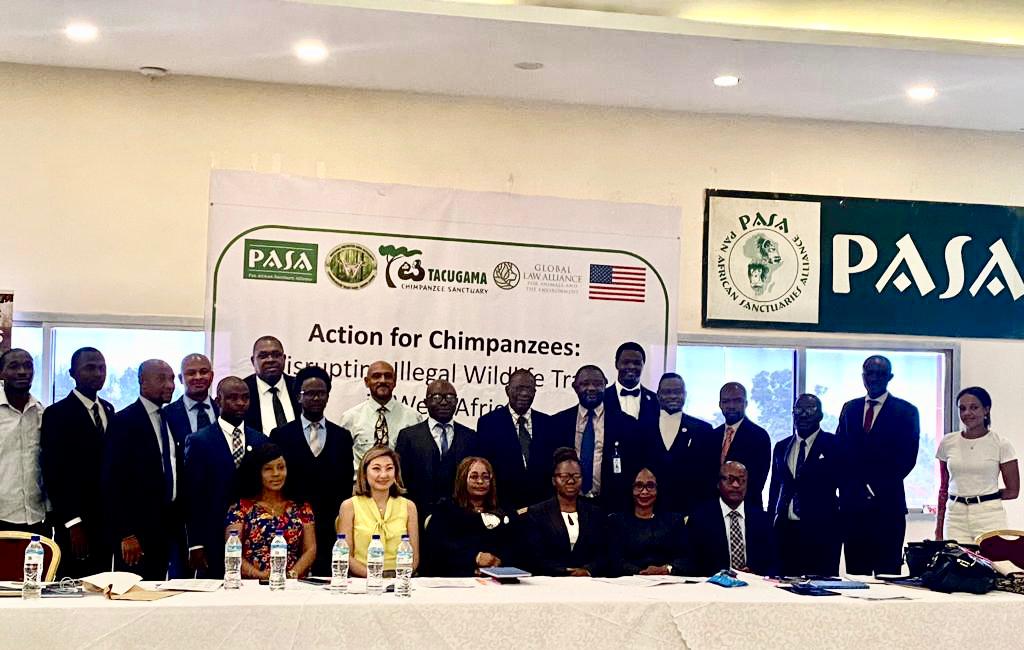232news
TCS Media Team
The Tacugama Chimpanzee Sanctuary (TCS) with funds from the United States Aid for International Development (USAID) and the Pan-African Sanctuary Alliance (PASA) on Friday 17th March 2023 ended a three-days training for the judiciary at the Sierra Bay Hotel, Aberdeen in Freetown.
The 25 participants, drawn from the Law Officers Department included senior judges like Justices Monfred Sesay, Komba Kamanda and Tonia Barnett. Others were from the National Protected Area Authority, the Environmental Protection Agency and private legal practitioners.
Action for Chimpanzee (AFC) is a multifaceted, two-year regional program (2021-2023) in West Africa funded by the United States Department of State’s Bureau of International Narcotics and Law Enforcement Affairs (INL), using local and international expertise and a targeted, data-driven approach to reduce trafficking of chimpanzees and other wildlife in Sierra Leone, Guinea, Liberia and Ivory Coast.
Chimpanzees are a high-value spices in the illegal wildlife trade, trafficked and exported by organized transnational criminal networks.
AFC is overseen by the US based Pan-African Sanctuary Alliance (PASA) in partnership with frontline organizations in the four targeted countries including TCS as well as international experts from Legal Atlas and Global Alliance for Animals and the Environment.
The goal of AFC is to reduce the poaching and trafficking of chimpanzees originating from or transiting through West Africa. Building on the existing partnerships between PASA, local chimpanzee rescue centers and conservation organizations and governmental agencies, the program will utilize innovation and data-driven approaches to improve the prevention, interdiction and prosecution of wildlife trafficking as well as increase transparency and collaboration between agencies and organizations in the region.
AFC will also use innovative genetic mapping of confiscated chimpanzees to identify poaching and trafficking hotspots. The increased capacity of local frontline groups and government agencies will ensure greater protection for chimpanzees and other wildlife from the threat of poaching and trafficking.
The training is to increase the capacity of law enforcement in Sierra Leone and the other countries to detect and interdict chimpanzee trafficking and their ability to seize illegal wildlife products through specialized training and sensitization of law enforcement and government officials.
Enhance the ability of national and regional wildlife law enforcement to prevent, detect and investigate chimpanzee trafficking in Sierra Leone and the other countries through improved habitat protection, increased information sharing and the genetic evaluation of confiscated chimpanzees living in rescue centers to establish origins and possible trade routes.
Improve national capacities for the prosecution and adjudication of chimpanzees and other wildlife trafficking cases and the delivery of appropriate sentencing in Sierra Leone and the other countries through training for prosecutors and judiciary officials.
Strengthen regional cooperation within and between relevant agencies in Sierra Leone and the other countries to enhance government response, accountability and transparency related to chimpanzee trafficking through innovative response, accountability and transparency related to chimpanzee trafficking through innovative communication mechanisms and cross-border protocols.
Statements were also made by the Executive Director of the National Protected Area Authority, the Program Director of TCS, Mr. Bala Amaresakaran, on behalf of PASA by Iris Ho and the Minister of the Environment and Climate Change.
Among the presentations by facilitators were an Overview of Wildlife Trafficking by Mr. Bala Amaresakaran, Program Director of TCS, and introduction to National Legislation by Dauda Bangura and Gibrilla Kamara and the relevance to CITIS in Sierra Leone by Mrs. Bintu Foray Gibril.
Highlights of the three-days training were visits to TCS at Regent, presentation of training program and international best practices by Erica Lyman, CITIS, an Enforcement and Prosecutor’s Perspective Identifying the Crime and Charging Best Practices.
Other topics discussed were Naturally Protected Species/Practical Exercise, Sourcing and Using Evidence: Best Practices, Penalties and Sentencing: Best Practices and round table discussions on legislative priorities and procedural challenges.
Some of the topical issues highlighted by participants were delay in court cases, the need to promote synergy among all the stakeholders, collaboration with communities for better outcomes as some communities are partners in crime, corruption, incessant sensitization of communities about the topics discussed and plans to holistically review the Environmental Laws to address modern day issues encompassing among others biodiversity, animals, flora and fauna.
Internet/electronic evidence, the lack of equipment, scientific examinations and the poor implementation of the Wildlife and Conservation Act were also challenges underlined.
Participants further agreed that with the availability of funds the training should be cascaded in the regions.
The issuing of licenses by one authority, the Ministry of the Environment and Climate Change, was also questioned and the need to engage Parliament was underscored.
Participants also unanimously consented to meet the various stakeholders to address the rampant encroachment of the Western Area National Park, especially TCS lands, sustainability of TSC, that the Environmental Court is now up and running, that there is need to strengthen the criminal justice system to combat wildlife crimes and that the three-days engagements were amazing and spirited.
Some of the participants like magistrates Hadiru Dabo and Sahr Kekura informed this medium that the training has capacitated them to know more about environmental laws and the protection of animals, especially endangered spices that would enable them effectively prosecute such cases.
Inspite of all these developments, it is sad to note that massive destruction and carnage is currently ongoing along the Tacugama axis in close proximity to the sanctuary.
From all indications, one can predict serious consequences with even the chimpanzees escaping from the sanctuary for fear of the fires that are been set by hoodlums/land grabbers and bulldozers getting closer to them.
A conducted tour of the TCS, presentation of certificates, souvenir teacups and T-shirts climaxed the training.

